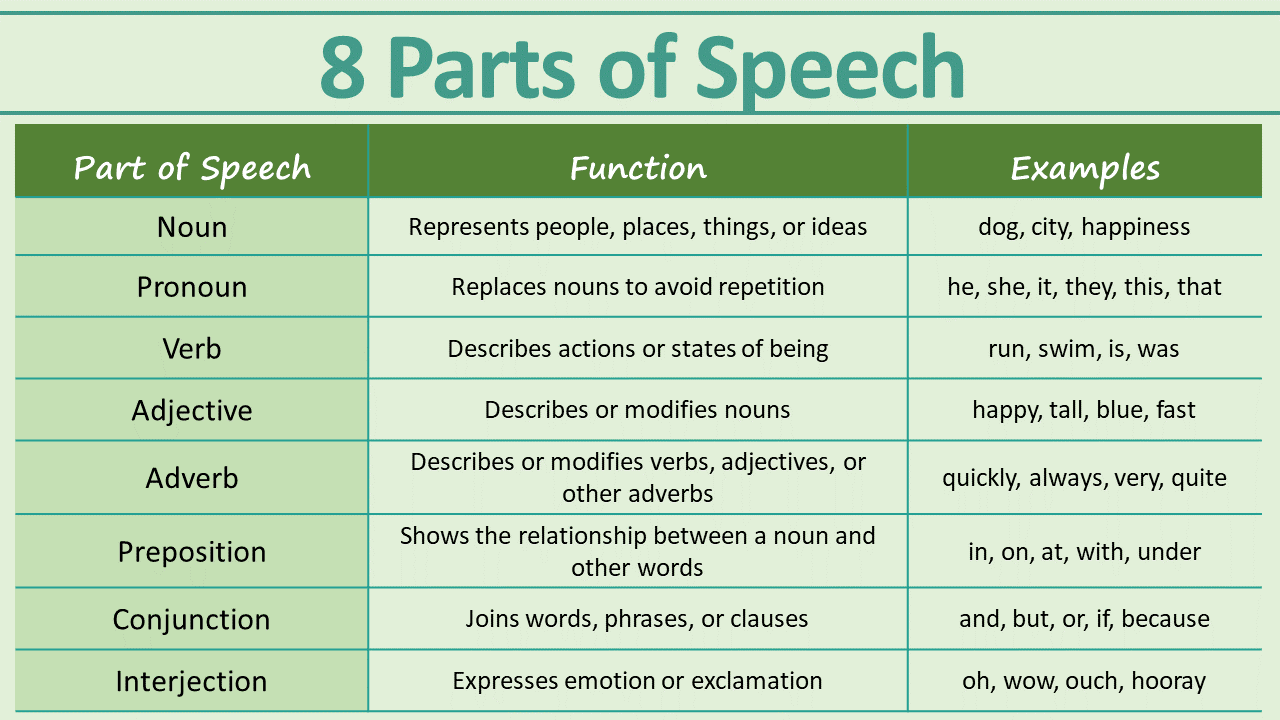Parts of speech are the categories of words based on their function in a sentence. There are eight basic parts of speech in English. Here are the main parts of speech with examples for beginners:
- Nouns: Nouns represent people, places, things, or ideas. They can be singular or plural, common or proper, and concrete or abstract.
- Examples: dog, city, happiness
- Pronouns: Pronouns replace nouns in a sentence to avoid repetition. They come in various forms such as personal, possessive, reflexive, and demonstrative.
- Examples: he, she, it, they, this, that
- Verbs: Verbs describe actions or states of being. They change form to express tense (past, present, or future) and can be regular or irregular.
- Examples: run, swim, is, was
- Adjectives: Adjectives describe or modify nouns, providing more information about their qualities or attributes.
- Examples: happy, tall, blue, fast
- Adverbs: Adverbs describe or modify verbs, adjectives, or other adverbs. They often provide information about how, when, where, or to what extent something happens.
- Examples: quickly, always, very, quite
- Prepositions: Prepositions show the relationship between a noun (or pronoun) and other words in a sentence. They often indicate location, time, or direction.
- Examples: in, on, at, with, under
- Conjunctions: Conjunctions join words, phrases, or clauses together in a sentence. They can be coordinating, subordinating, or correlative.
- Examples: and, but, or, if, because
- Interjections: Interjections are words or phrases that express emotion or exclamation. They usually stand alone and are not grammatically connected to the rest of the sentence.
- Examples: oh, wow, ouch, hooray
Parts of Speech with Examples English grammar lessons for beginners
Some more Example Sentences using Parts of Speech
Here are more example sentences using the different parts of speech:
- Nouns:
- The teacher (noun) explained the lesson (noun) to the students (noun).
- Pronouns:
- When John (noun) finished his (pronoun) homework, he (pronoun) went to play basketball.
- Verbs:
- The sun shines (verb) brightly during the day.
- Adjectives:
- The red (adjective) ball (noun) bounced high (adjective) into the sky (noun).
- Adverbs:
- Mary (noun) sings (verb) beautifully (adverb) in the choir (noun).
- Prepositions:
- The book (noun) is on (preposition) the table (noun).
- Conjunctions:
- I wanted to buy a new phone (noun), but (conjunction) I didn’t have enough money (noun).
- Interjections:
- Yikes (interjection)! I (pronoun) forgot (verb) to bring my (pronoun) umbrella (noun).
Using multiple parts of speech in a sentence:
- On (preposition) a sunny (adjective) day (noun), the children (noun) happily (adverb) played (verb) soccer (noun) at (preposition) the park (noun) while (conjunction) their parents (noun) watched (verb) and (conjunction) cheered (verb).
These examples demonstrate how different parts of speech work together to create meaningful sentences. Understanding the roles of each part of speech can help beginners improve their English grammar and communication skills.
Parts of Speech Sentence Analysis to identify Parts of Speech
Here are five sentences for you to analyze. I’ll provide the answers after the exercise.
- The children enjoyed playing games at the party.
- She carefully placed the fragile vase on the shelf.
- Unfortunately, he missed the train because he woke up late.
- Wow! That was an amazing performance.
- If it rains tomorrow, we’ll stay home and watch a movie.
Analyze each sentence by identifying the parts of speech for each word. Once you’ve completed the exercise, check your answers below.
Answers:
- The (article) children (noun) enjoyed (verb) playing (gerund verb) games (noun) at (preposition) the (article) party (noun).
- She (pronoun) carefully (adverb) placed (verb) the (article) fragile (adjective) vase (noun) on (preposition) the (article) shelf (noun).
- Unfortunately (adverb), he (pronoun) missed (verb) the (article) train (noun) because (conjunction) he (pronoun) woke (verb) up (adverb) late (adjective).
- Wow (interjection)! That (demonstrative pronoun) was (verb) an (article) amazing (adjective) performance (noun).
- If (conjunction) it (pronoun) rains (verb) tomorrow (noun), we (pronoun) will (‘ll – auxiliary verb) stay (verb) home (adverb) and (conjunction) watch (verb) a (article) movie (noun).
